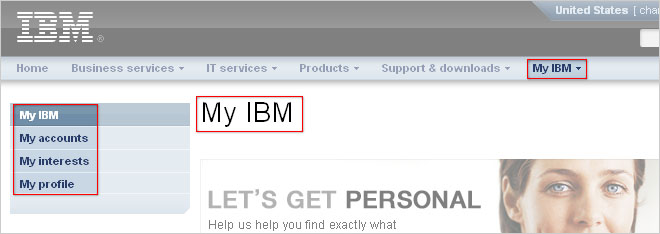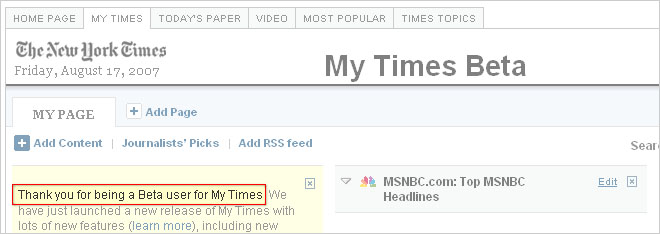In this final chapter of Pronoun vs. Pronoun (see previous chapters User vs. You, User vs. Tron, and You vs. I), we will now weigh in on the great schism between Me and You.
Almost every web design team I’ve ever worked with has had to, at some point, wrestle with the “Me vs. You” question. In this great debate, the winner was You over at YouTube and YouSendIt.com, and many years ago You won at U-Haul. But the winner was Me over at MyYahoo!, and at MySpace, and at countless other personalized “my.foo.com” sites.
This debate between Me and You, or My and Your, comes up whenever we try to name a personalization feature, or when we need a name the part of the site where personalization appears, or whenever we want to communicate directly to the user in a conversational way. How shall we, the designers, address the user when speaking to them this way? Is the user the “other”, an external, second person with respect to the site or the company, or to the site’s designers? Shall I address the user conversationally as “you”?, or should we try to keep the user distant and only use the third person?

Or does this “conversation” between the web site and You feel a little distant, impersonal, maybe even a little phony? I mean, it’s not like Amazon.com is a sentient person who can actually talk to us. You’re reading computer generated text about your books, your account. Maybe some site designers feel as if the site’s voice should be your voice, as if you were talking to yourself. (e.g., “This is my site!)

It seems like You is used for conversational or imperative modes of communication, while My is often used for nomenclature and branding. Frequently-asked-questions are also usually told with My voice (“How do I format my Windows hard Drive?”), while instruction manuals are generally addressed directly to You.
Product designers, copywriters, and information architects will argue about this forever, but we get really agitated when we see Me and You alternating on the same page!

Thank you for being a Beta user for My Times? Wait, whose Times is it? Is it My Times, or is it Your Times?
Of course, the worst is when computers refer to themselves in the first person. Unless the computer is a certified Turing Test-winning AI, I’m not comfortable with a machine acting like a person through the use of human pronouns. Machines should never use the pronoun me to refer to itself.

As far as I am concerned, the only products that should be allowed to refer to themselves in the first person are made by Apple and begin with the lower case letter i.
Comments
6 responses to “Me vs. You (vs. i)”
I think the whole problem with the I/thou/you/me/my “thing” is the sheer overuse. In your IBM example above, the term “my” becomes superfluous. If it’s “My” site, shouldn’t the menu items just read “Accounts, Interests, Profile”. I mean, how could it possibly be someone else’s account, interests, or profile?
I agree. Websites are not sentient beings, and Mr. Amazon (as opposed to Mr. Bezos) is not talking to *you*. There is no conversation, but there is interaction. Quite frankly, sometimes it’s not all about me.
(quote)Thank you for being a Beta user for My Times? Wait, whose Times is it? Is it My Times, or is it Your Times?
Well, if you’re here, and I’m here, doesn’t that make it “Our Times”?
Spicoli!
Of course, the website cannot actually talk to you, but nonetheless I appreciate the use of second person at sites like flickr where some effort has been made to make you feel like there are actual humans with a sense of humor behind the site. The use of informal prompts mixed with first person buttons (“I’m not sure of the exact time”) adds to the friendly feeling of the site.
By contrast I find that more often than not the first person feels patronizing, like the designers think I am an inexperienced user that needs to have every folder labelled cute things like “My Pictures”.
@Lauren: I was thinking along the same lines, that what sometimes looks like the second person is actually simply the voice of a real person engaged in a conversation with you, much as I am doing here in this paragraph and indeed on this blog. In many ways, I suppose that Flickr is a child of blog culture, and the Flickr brand is still that of a mom-and-pop operation. Of course, it’s not mom-and-pop by a long shot, but I think the brand positioning is here to stay, and I agree with you that the informality is engaging and comforting.
I agree with that first comment: Often the pronoun is completely superfluous. It grates on me like “His/Hers” towel sets.
I always disliked Windows’ way of prefixing everything with “My…” but I couldn’t really say why. Now this post makes me realize it could have been worse: what if they had chosen “Your Documents”?
“Your” seems much worse in that context, because I should feel as though I’m interacting directly with those items as though I were actually holding them, and not like a dialogue between one Mr. User, and the esteemed Mr. Computer which is putting on the airs of a servile butler. “Your Pictures, sir.” Ugh.
In the case of websites, “Yours” can seem slightly more appropriate since it’s almost a dialogue between the user and the site. But, this could be just an artifact of the HTTP protocol and how we, the techie types, tend to visualize the whole exchange. After all, the users interact with a “server” that is “serving” information to them. It implies remoteness.
So, compare the server to my butler reference: on my computer it’s mine (I don’t want a butler touching my stuff), but on the web it’s served to me. I think that’s the only reason why “yours” can sometimes seem slightly better there, but is that just a technological quirk? Why should the desktop and the web treat the user differently?
I think the computer, or the website–or actually any interface–needs to just step out of the way and not interact in a dualistic mode with the user. So, if it’s clearly personal, why even use “yours/mine”? Shouldn’t it be assumed?
The Mac has standard folders for “Documents” and “Pictures”. I can just assume that when they’re in the folder named “andrew”, they’re mine.
Items in my real-world filing cabinet are not filed under “My”. I either assume they’re mine, or I label them with a person’s name.
Think about how seldom we actually use first and second personal pronouns to label anything in the real world. (Have you ever seen those joke business cards that just have the words “My Card” printed in the centre in flowing script?)
The word “interface” itself implies duality, but we should try and look beyond that to emulate some of the assumptions we make naturally in the real world. Cogito ergo sum.